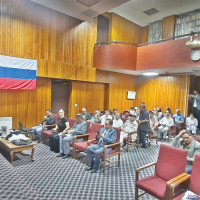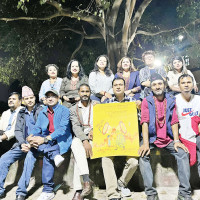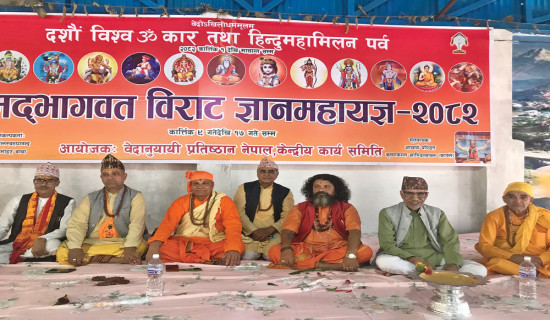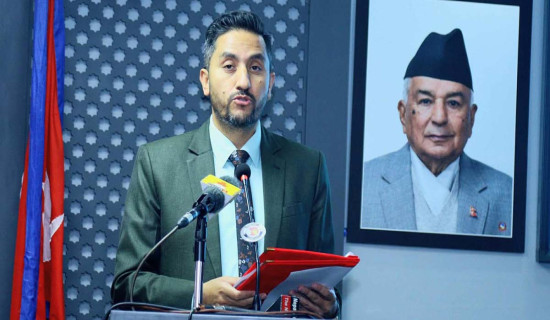- Wednesday, 22 October 2025
Youths Falling Prey To Chemical Drugs
On an annual basis, thousands of kilogrammes of cannabis are seized and destroyed throughout the country, with hundreds of individuals arrested. Cannabis is the most confiscated drug in Nepal because it grows abundantly. Moreover, it has been a getaway for Nepalis for centuries, used either as medicine or for recreation. According to Nepal Police Mirrors, 155,644.75 kilogrammes and 11,079.66 kilogrammes of cannabis were confiscated in 2021 and 2022, respectively. Alongside cannabis, hashish, a compressed and processed drug made from cannabis, is also seized in large quantities. In 2021, 21,917.48 kilogrammes of hashish were confiscated. Officers at the Narcotics Control Bureau (NCB) argue that the trend of cannabis users is still worrisome because its use for recreation is always harmful. However, while authorities have been focusing much on cannabis, more potent and harmful chemical drugs have crippled the lives and health of many youths.
Recent confiscations, arrests, and investigations have shown that the number of Nepalis getting attracted to chemical drugs such as heroin (brown sugar) and cocaine alongside harmful pharmaceutical drugs is on the rise. In a recent talk, NCB’s spokesperson, Superintendent of Police (SP) Chakra Raj Joshi, said that the demand for more potent drugs by Nepalis was rising further. According to SP Joshi, the use of chemical drugs has a dire effect on one’s health. However, in the name of recreation or anti-depressants, youths, and teenagers were falling prey to a more hazardous situation. There are several reasons why people opt for more potent drugs.
Youth more vulnerable
Alcohol and cigarettes were Sapkota's first forays into drugs for a 28-year-old mechanical engineer who only wanted to be known by his last name. "Before passing the SLC, my buddies and I started smoking cigarettes. Alcohol had become close to us by the time we crossed the SLC. When I was studying in Plus Two, it was time for cannabis," said Sapkota. "But when I reached college for my bachelor’s degree, I came across pharmaceutical drugs, which changed everything. The most dissatisfying thing is that I continued despite knowing that it was extremely harmful," he added.
Pharmaceutical drugs include those that are used as painkillers or anti-depressants. They are found either in tablet or liquid form, allowing the users to either consume them orally or through injection. "In the first year, I started orally. Within months, I had already started injecting the drugs. While one ampule of the drug would be enough at first, within a couple of years, I had reached a stage where I mixed three drugs and injected them," said Sapkota.
It was only when Sapkota was rushed to the hospital after he was found unconscious by his hostel warden last year. "I don't know if the medications had anything to do with it. But witnessing my situation crushed me. After that, I went to a treatment facility and stayed there for six months," he added.
There are around 35 individuals, mostly aged 22–26, in the rehabilitation home. Of them, six are friends of Sapkota. According to the warden at the rehabilitation home, the majority of the youths were addicted to pharmaceutical drugs and brown sugar. “My body started turning skinny, and I would always struggle to keep myself calm. When I could not control it myself, I confessed to my parents and joined the rehabilitation home following the suggestion of Sapkota," said Koirala, a 25-year-old friend of Sapkota.
Harmful chemical drug
Methamphetamine (Ice) and LSD (Lysergic acid diethylamide) are two of the most expensive chemical drugs globally. While Ice is found in powder form like cocaine, LSD is available in nail-size stickers. Methamphetamine and cocaine both cost Rs. 25,000 per gramme, respectively, and a sticker of LSD costs Rs. 2,000 per piece. Similarly, heroin costs Rs. 10,000 per gramme, and a set of three pharmaceutical drugs can be bought for Rs. 300. "These drugs are more expensive, more potent, and more harmful than cannabis, a local drug from Nepal. However, brown sugar has even reached the remotest part of the country, including the districts of Humla and Jumla in Karnali," said SP Joshi.
Some health experts have opined that an individual will be addicted to any drug because s/he finds a proper relaxation of the mind. Many drug users said that they did not only have a relaxed mind but were also in a better condition than being drunk. Police officers argue that people fall into drug addiction due to a lack of support from parents or a bad company. A need to act "cool" is also a major reason for youngsters to use drugs. If someone opened the NCB’s Facebook page, the flow of statements of arrests and drug confiscations shows how dire the situation is. The federal, as well as local governments, can be seen taking different steps against drug abuse. However, an attraction to more potent drugs despite cannabis growing abundantly across the country shows that the steps have been ineffective. Many also argue that cannabis legalisation can be a way to prevent the use of harmful chemical drugs.
In a span of three years (2020–2022), 77.97 kilogrammes of cocaine and 160.5 kilogrammes of heroin have been seized in Nepal. Moreover, alongside modern and expensive drugs like Ice and LSD, over 20 kilogrammes of khat, a stimulant drug made from a local plant in eastern and southern Africa, were also confiscated recently in Kathmandu.
Preventive measures
Stakeholders have argued that the authorities should be more concerned about drug abuse as the smuggling of harmful drugs is increasing. They have stressed the need for strengthening border security with India as heroin and pharmaceutical drugs are smuggled from there. Similarly, there is a need to strengthen the security and checking systems at the Tribhuvan International Airport (TIA) alongside the newly opened Gautam Buddha International Airport and Pokhara International Airport because cocaine, Ice, and LSD, among others, are smuggled from abroad via air.
Promoting extra-curricular and sports activities in schools is crucial for fostering quality development among students and deterring them from engaging in drug abuse. These activities provide students with opportunities to explore their interests, develop creative skills, and build strong social connections. By participating in sports and extra-curriculars, students can channel their energy into productive endeavors, keeping them engaged and focused on positive pursuits. Additionally, parents play a vital role in supporting their children's well-being.
By fostering a friendly and open relationship, parents can create a safe space for their children to share their problems and concerns. This enables parents to provide the necessary guidance, support, and resources to help their children overcome challenges and move forward healthily and constructively.
(The author is a TRN journalist who covers crime and health issues.)

















